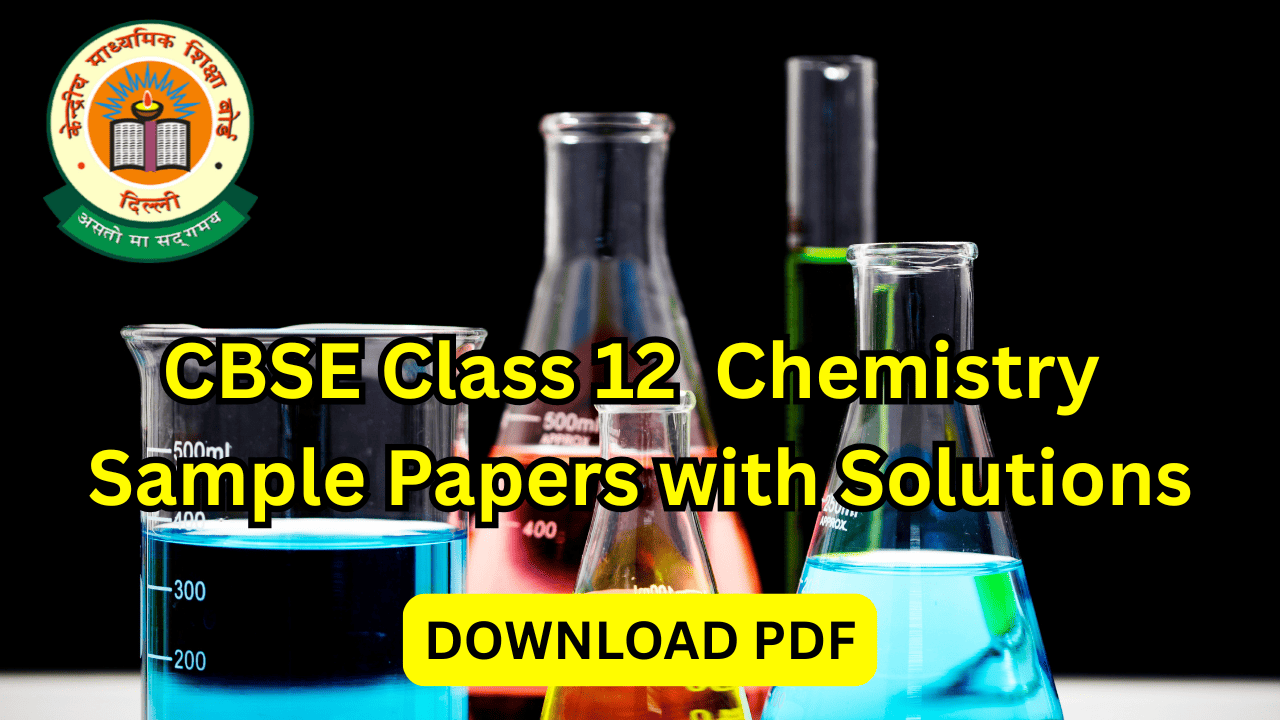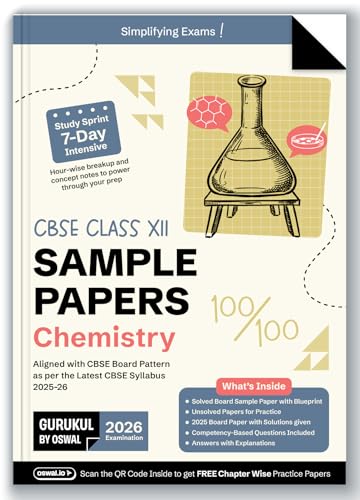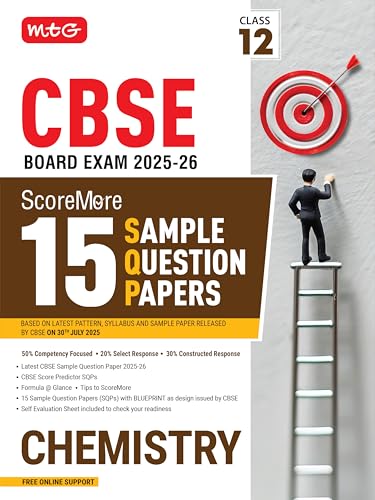If you’re preparing for the Class 12 Chemistry board exam, start with the official CBSE sample papers—not random market books. These are created by CBSE itself, align perfectly with the latest syllabus & exam pattern, and come with the official marking scheme so you learn exactly how answers are awarded.
In this post, you’ll get:
- Official CBSE Chemistry Sample Paper (PDF)
- Official Marking Scheme/Solutions (PDF)
- How to use them for 90+ preparation
- Handpicked books for extra practice (optional—only after you finish the official set)
CBSE Class 12 Chemistry (2025–26): Quick Snapshot
| Feature | Details |
|---|---|
| Subject | Chemistry |
| Class | 12 |
| Session | 2025–26 |
| Exam Duration | 3 hours (as per CBSE design) |
| Paper Type | Theory (board exam) + separate practical (school) |
| Official Sample Paper | Free PDF below |
| Official Marking Scheme | Free PDF below |
| Best Strategy | Official sample paper → NCERT revision → (optional) extra books |
| Extra Practice | Curated Chemistry sample paper books (links below) |
Why Start with Official CBSE Sample Papers (Not Market Books)
- Exact pattern & difficulty: Only official CBSE sample papers reflect the current exam blueprint.
- Marking-style answers: The official marking scheme shows exactly how examiners award marks.
- No confusion: Market books often follow outdated or mismatched patterns, which wastes time.
- Your roadmap: Use them to identify precise gaps, then fix those using NCERT.
Bottom Line:
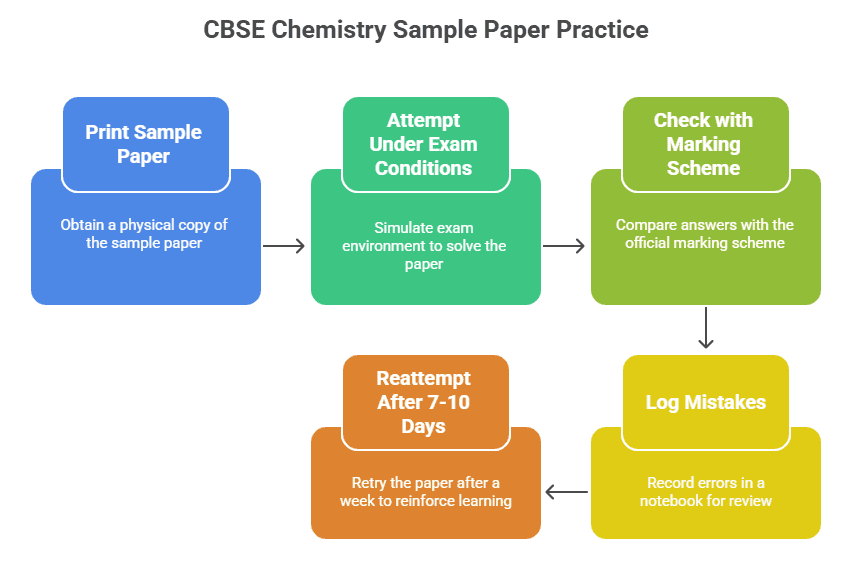
CBSE Class 12 Chemistry Sample Paper 2025–26: Paper Pattern Overview
| Section | Question Type | No. of Questions | Marks per Question | Total Marks | Weightage |
|---|---|---|---|---|---|
| A | Multiple Choice Questions (MCQs) | 16 | 1 | 16 | Concept clarity, NCERT-based |
| B | Short Answer | 5 | 2 | 10 | Direct NCERT & application |
| C | Short Answer | 7 | 3 | 21 | Reasoning + problem-solving |
| D | Case-Based | 2 | 4 | 8 | Experimental, higher-order thinking |
| E | Long Answer | 3 | 5 | 15 | Detailed explanation, derivations, mechanisms |
| Total | – | 33 | – | 70 | Time: 3 hours |
Key Insights & Preparation Strategy
- Section A (MCQs – 16 Marks): Mostly NCERT-based, test fundamental concepts. Focus on exceptions, reactions, and reasoning-type MCQs.
- Section B (2-mark Qs – 10 Marks): Short and precise answers expected. Directly revise NCERT intext questions.
- Section C (3-mark Qs – 21 Marks): Conceptual + numerical type. Equilibrium, Electrochemistry, Solutions, Coordination Compounds are important.
- Section D (Case-based – 8 Marks): Application-based questions testing experimental/real-life chemistry. Practice NCERT case studies.
- Section E (5-mark Qs – 15 Marks): Mechanisms, derivations, and detailed problem-solving. Questions usually come from Organic Chemistry & Physical Chemistry.
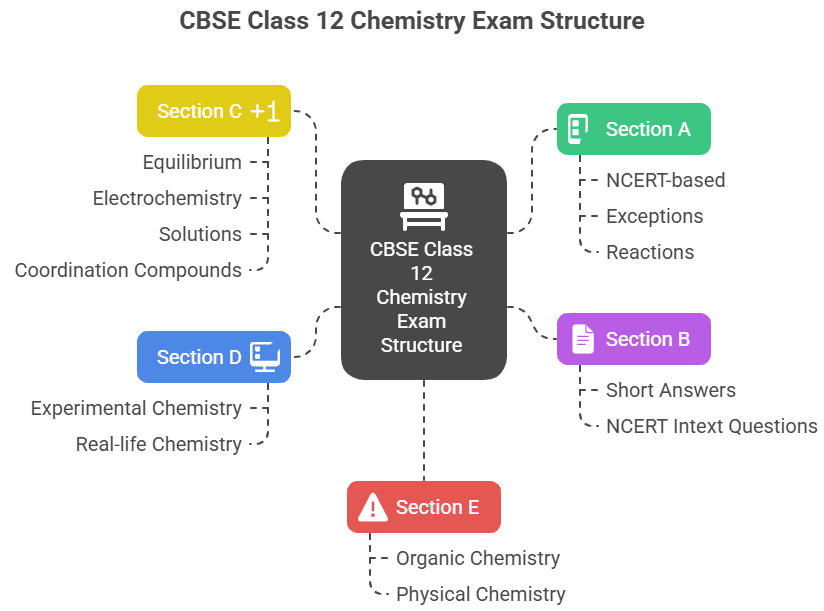
How do I use the Chemistry marking scheme effectively?
Compare step-wise: Did you write the exact formula, show the step, and give units? For theory, match NCERT keywords—rewrite your answer if your phrasing is vague.
Are official CBSE sample papers enough for 90+ in Chemistry?
Yes—if you (1) finish NCERT thoroughly, (2) attempt the official sample paper 2–3 times, (3) practice 3–5 PYQs, and (4) fix errors using an error log. Add a market book only for extra mock practice.
What’s the best order to attempt the paper?
Start with your strongest section (often short theory/AR) to build momentum → then numericals (fresh mind) → finish with long Organic/Inorganic answers → reserve 10–15 minutes to verify units, balancing, and missed sub-parts.
CBSE Class 12 Chemistry Sample Papers with Solutions – PDF Download
| Year | Sample Paper | Marking Scheme |
|---|---|---|
| 2025-26 | Download | Download |
| 2024-25 | Download | Download |
| 2023-24 | Download | Download |
| 2022-23 | Download | Download |
| 2021-22 Term 1 | Download | Download |
| 2021-22 Term 2 | Download | Download |
| 2020-21 | Download | Download |
| 2019-20 | Download | Download |
| 2018-19 | Download | Download |
| 2017-18 | Download | Download |
| 2016-17 | Download | Download |
Also See: CBSE Class 12 Chemistry PYQs with Solutions PDF
How to Practice the Official Paper
- Simulate the exam: 3 hours, no notes, full silence.
- Self-evaluate with the official marking scheme:
- Circle keywords you missed.
- Note units, significant figures, and steps penalized in numericals.
- Maintain an Error Log (table):
- Topic | Question Type | What went wrong | Correct idea/step | Fix (flashcard/page)
- Reattempt the same paper after 7–10 days → aim for 100% on your error areas.
How important are diagrams and equations in Chemistry answers?
Very important. Even in 2–3 mark answers, balanced equations, mechanisms, and neat diagrams (like molecular orbitals, electrolytic cell setup, etc.) can fetch full marks.
What is the ideal time management strategy for Chemistry paper?
MCQs & 2-markers → 35–40 mins
3-markers → 55–60 mins
Case-based → 25–30 mins
5-markers → 40–45 mins
Revision → Last 15–20 mins
Is NCERT enough for Class 12 Chemistry board exams 2025–26?
Yes, NCERT is the primary source. However, for numerical practice, refer to exemplar problems and sample papers. For organic mechanisms, NCERT + PYQs are more than enough.
Extra Practice Books (Optional—After Official Paper)
If you still need more practice after mastering the official CBSE sample paper + marking scheme, you can pick one of these:
